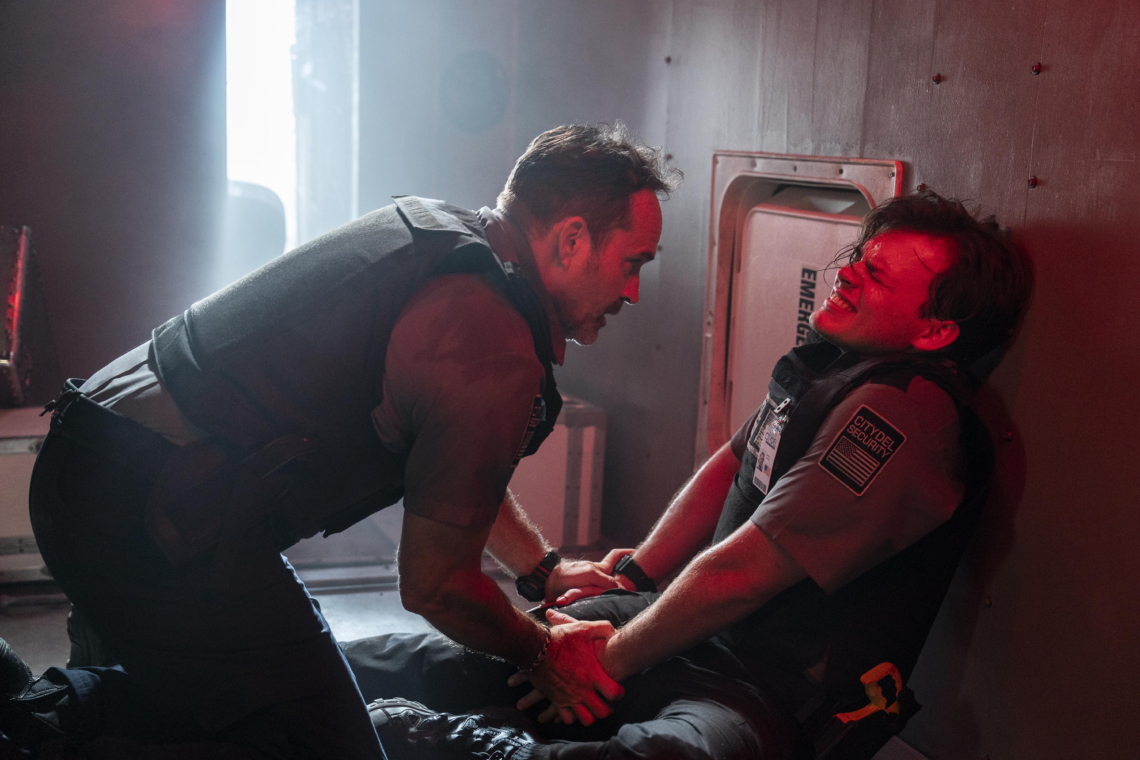Sylvester Stallone has seldom played the villain onscreen, and judging from the stolidity of his turn in “Armor,” it seems unlikely he’s wanted to. That lack of enthusiasm will be echoed by most viewers watching this uninspired action programmer, in which top-billed Jason Patric’s driver and coworker-son Josh Wiggins get waylaid by armed robbers while transporting bank funds — and, unknown to them, some even-more-valuable contraband.
Primarily taking place on a rural bridge where good guys and bad have a prolonged standoff, Justin Routt’s Mississippi-shot feature is competently made. But neither its staging nor its performances transcend the limitations of Adrian Speckert and Cory Todd Hughes’ script, leaving mediocre material unredeemed by any special thrills, style, or character detailing. Lionsgate is launching the film simultaneously in U.S. theaters, digital and on-demand platforms Nov. 22.
When not behind the wheel of an armored vehicle, ex-cop James Brody (Patric) is moderating AA meetings. He’s ostensibly been sober six years since hitting bottom after his wife died in an accident he blames himself for. But in fact, he’s still imbibing on the sly, a fact that’s seemingly eluded the detection of son Casey (Wiggins), who himself now has a wife and a baby on the way. You’d think Junior would notice, given that they work together most days transporting cash between banks. But then “Armor” has several core implausibilities.
Popular on Variety The main one is that somehow nobody notices, or calls the police, when their tightly scheduled route is hijacked by Rook (Stallone) and his small squad of co-conspirators. Chased and rammed, the truck is finally stopped in the middle of a rural bridge with plenty of structures within sight — so it makes no sense that this squealing-tires fracas, let alone the gunfire and explosions that follow, don’t immediately draw officers of the law. Also, wouldn’t an armored vehicle bearing so much cash be monitored via GPS tracking system? What happens here isn’t really exciting enough to make you stop asking those nagging questions.
In any case, father and son find themselves facing a half-dozen heavily armed men in black, including Dash Mihok, Joshua David Whites and Blake Shields as well as Stallone. They intend to abscond with loot that turns out to encompass drug cartel riches our heroes had no idea they were transporting. When resistance is met, tactics get dirtier on both sides, with the Brodys retreating to the armored truck interior after Casey is wounded. There, they endure attempts at being gassed and sweated out, but also find ways to winnow the opposition forces.
“That rent-a-cop’s a tough sumbitch,” says one bad guy in eventual grudging admiration … and in what’s unfortunately a fair example of the generic dialogue here. About halfway through, we get a flashback to the tragedy that derailed James’ life, with Erin Ownbey as his late spouse. That also feels strictly rote as the script’s sole notable attempt at character backstory and depth.
You can’t blame the actors here for failing to make much of roles so undistinguished in the writing. No one is bad, exactly, but no one is trying very hard, either. In Stallone’s case, trying at all doesn’t seem to be on the agenda — this appearance is his equivalent to some of Bruce Willis’ later ones, in which the big star name can’t or won’t hide that he’s just showing up for a paycheck. His criminal mastermind is softened by the late claim that he’s “not a killer … it’s not in my nature.” But as he’s the boss of this outfit, that statement makes it confusing that hitherto his subordinates seemed quite eager to off our protagonists. For that matter, if the Brodys’ lives were going to be spared, why don’t the bad dudes do anything to hide their faces from easy identification?
Sloppy as such logic is, “Armor” might’ve been fun if there was more humor to it, or if the modest action setpieces were executed with some panache. Instead, we are all too aware that we’re stuck on a bridge with a lot of argumentative blowhards, uncertain why no other cars come by to note the blocked roadway … let alone why police aren’t hustling to what must be a rare outburst of very noisy crime in this rural area. What ideally ought to play out as a pressure-cooker thriller in real time comes off far less tense than it should, never quite growing dull but edging dangerously close.
The best elements in the professional production assembly are Cale Finot’s widescreen cinematography and the bayou locations — neither of which are exploited to their full potential, but are attractive nonetheless. Also earning points for at least trying to add some regional atmosphere is a soundtrack full of various-artist cuts in a bluesy, twangy Southern rock mode.

 Italian
Italian







